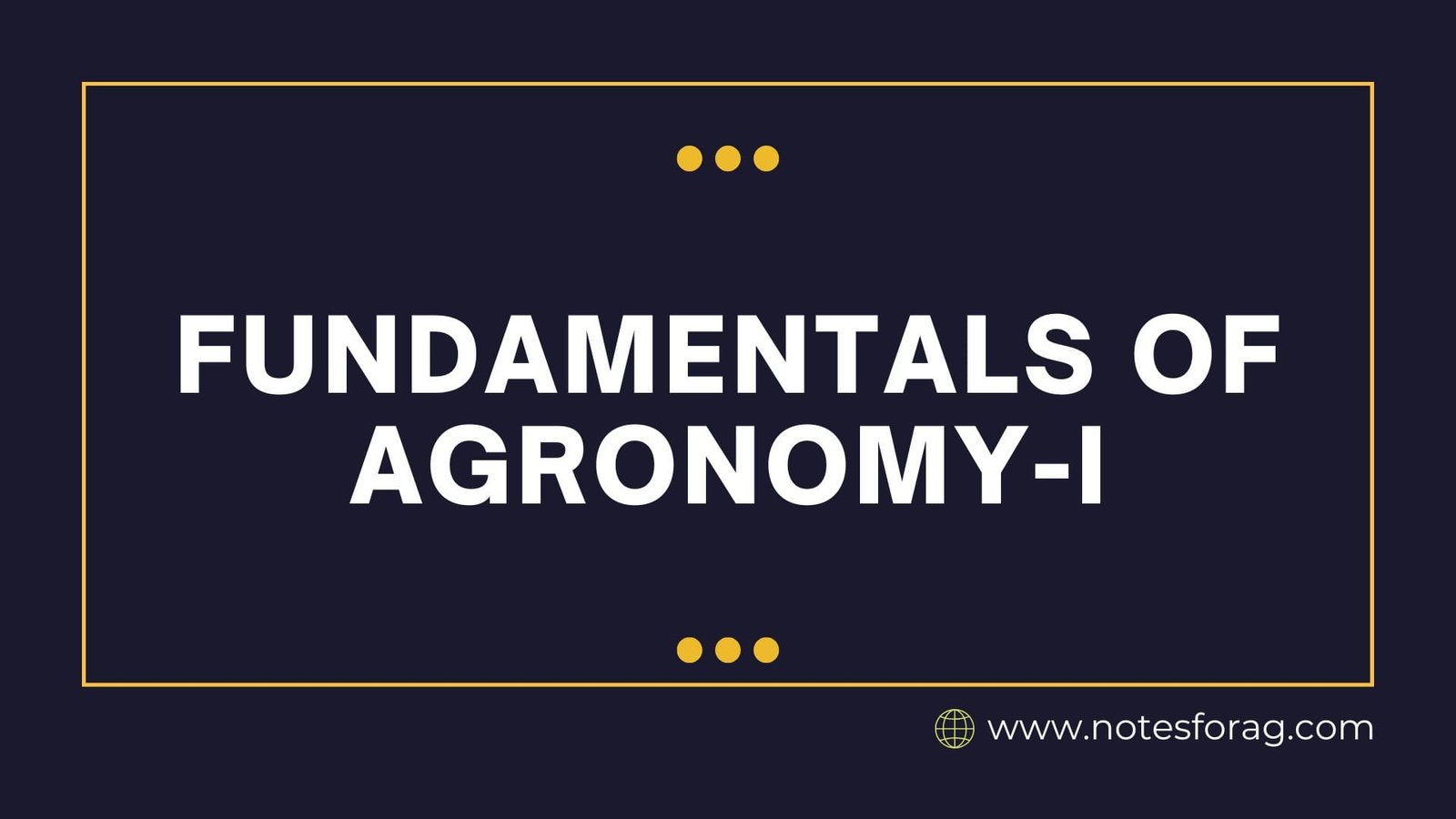Fundamentals of Agronomy-I is an essential introductory course for agricultural studies. This course lays a comprehensive foundation in agronomy’s core principles and practical applications. Students will delve into the intricacies of crop production, exploring various methods and strategies to optimize yield and quality. Additionally, the Fundamentals of Agronomy-I curriculum emphasizes the importance of effective soil management practices, allowing students to understand how soil health impacts overall agricultural productivity. Sustainable farming techniques are another key focus, equipping learners with knowledge on cultivating crops responsibly while conserving natural resources for future generations. Through a blend of theoretical insights and practical applications, this course aims to prepare students for a successful career in the dynamic world of agriculture.
Table of Contents
Core Topics Covered by Fundamentals of Agronomy-I
Introduction to Agronomy
Definition, scope, and role in agriculture.
Soil Science
The properties of soil, the levels of nutrients it contains, and the relationship between soil and water all play a crucial role in the ecosystem.
Climatic Factors
The effects of weather, temperature, and rainfall on crops and their growth.
Cropping Systems
Agricultural practices such as monocropping, intercropping, and crop rotation.
Tillage and Soil Preparation
Various methods for preparing the soil and ensuring the ground is ready for planting seeds.
Sowing and Planting
Techniques for sowing seeds, the proper spacing, and various factors that influence seed germination.
Manures and Fertilizers
Fertilizers can be categorized into organic and chemical types, along with the practice of integrated nutrient management (INM).
Irrigation and Water Management
Exploring irrigation techniques and enhancing water use efficiency.
Weed Management
Different types of weeds and effectively integrated methods for controlling them.
Harvesting and Post-Harvest Handling
Key factors to consider include maturity indicators, harvesting techniques, and storage methods.
Crop Physiology
Plant functions such as photosynthesis, respiration, and managing stress play crucial roles in their overall health and survival.
Pest and Disease Management
Integrated pest management (IPM) and the use of biological control methods.
Agricultural Meteorology
Weather forecasting plays a crucial role in agriculture by providing valuable insights that help farmers make informed decisions. By understanding weather patterns and predictions, agricultural practices can be optimized to enhance crop yields and manage resources effectively.
Sustainable Agriculture
Practices of conservation agriculture and organic farming.
Learning Objectives
- Basics of Agronomy: Understand the definition, scope, and principles of agronomy.
- Soil and Crop Management: Learn soil preparation, cropping systems, and crop rotation.
- Climatic Factors: Understand the impact of temperature, rainfall, and sunlight on crops.
- Agronomic Practices: Study sowing, irrigation, and sustainable farming techniques.
- Nutrient and Weed Management: Learn about plant nutrients, fertilizers, and weed control.
- Sustainability: Explore organic farming, conservation agriculture, and agroforestry.
- Modern Tools: Familiarize with precision agriculture and related technologies.
- Practical Skills: Develop hands-on skills in field experiments and resource calculations.
Applications
The knowledge from Fundamentals of Agronomy-I is vital for:
- Optimize crop planting, spacing, and growth practices.
- Manage soil fertility and improve water use efficiency.
- Control weeds for better crop productivity.
- Apply fertilizers effectively to meet crop nutrient needs.
- Adapt crops and practices to local climatic conditions.
- Implement eco-friendly pest and disease management techniques.
- Promote sustainable practices like crop rotation and organic farming.
- Utilize farm machinery for efficient operations.
- Support farmers through training and technology transfer.
Conclusion
Fundamentals of Agronomy-I provides the foundational knowledge essential for understanding and implementing effective agricultural practices. By integrating principles of soil management, crop production, and sustainable farming, the subject equips learners with the skills to enhance agricultural productivity while conserving natural resources. With a focus on modern techniques and environmental stewardship, Fundamentals of Agronomy-I lays the groundwork for developing innovative solutions to meet the challenges of food security and sustainable agriculture. This knowledge empowers students to contribute effectively to the agricultural sector and ensure long-term ecological balance.
Frequently Asked Question
What is Agronomy?
Agronomy is a branch of agriculture that focuses on the study of crops and the soils where they thrive. Its primary aim is to enhance agricultural productivity sustainably.
What are the key topics covered in Fundamentals of Agronomy-I?
Fundamentals of Agronomy-I generally focuses on key topics such as soil management, crop production, the effects of climate, as well as nutrient and weed management. It also delves into irrigation techniques and sustainable farming practices.
What is the significance of weed management?
Effective weed management is essential to minimize competition for vital resources such as nutrients, water, and sunlight, ultimately leading to improved crop yields.

